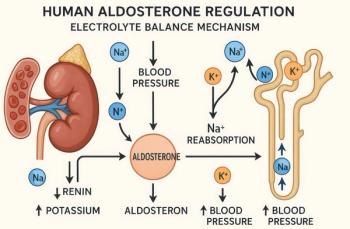
ACE Inhibitor May Ease Cardiac Risks in Marfan's Syndrome
MELBOURNE, Australia -- An angiotensin-converting enzyme inhibitor reduced aortic stiffness and dilation in Marfan's patients taking standard beta-blockers, according to a preliminary study.
MELBOURNE, Australia, Oct. 3 -- An angiotensin-converting enzyme inhibitor reduced aortic stiffness and dilation in Marfan's patients taking standard beta-blockers, according to a preliminary study.
The ACE inhibitor, perindopril (Aceon), taken for 24 weeks, reduced large-artery stiffness and aortic root diameters in both systole and diastole, Bronwyn A. Kingwell, Ph.D., of the Baker Heart Research Institute here, and colleagues, reported in the Oct. 3 issue of the Journal of the American Medical Association.
This study's novel finding, the researchers wrote, was that the drug not only reduced aortic diameters, relative to placebo, in both systole and diastole, but that in diastole, perindopril led to aortic diameters below baselines by an average of 1.2 to 3.0 mm/m2.
The results emerged from a randomized double-blind, placebo-controlled trial of 17 patients (mean age 33) with the autosomal-dominant connective tissue disorder taking standard beta-blocker therapy. The syndrome is caused by mutations in the gene encoding for fibrillin 1.
The trial at the Alfred Hospital Marfan Syndrome Clinic here was started in January 2004 and was completed in September 2006. Ten patients were given 8 mg a day of perindopril, while seven received a placebo for 24 weeks.
Arterial stiffness was assessed by systemic arterial compliance, and central and peripheral pulse-wave velocities. Aortic-root diameters were assessed at four sites by transthoracic echocardiography.
Dosage for perindopril started at 2 mg/d for one week, rising to 4 mg/d for two weeks, and thereafter to 8 mg/d for 21 weeks.
Perindopril reduced arterial stiffness as indicated by increased systemic arterial compliance from a mean 0.33 mL/mm Hg at baseline to 0.54 mL/mm Hg at 24 weeks in the perindopril patients.
This compared with 0.30 mL/mm Hg to 0.29 mL/mm Hg in the placebo group, P=0.004).
Central pulse-wave velocities were reduced from 7.6 m/s to 5.9 m/s in the perindopril group, (P<0.001 versus placebo), the researchers said.
Peripheral velocities went from 10.9 m/s to 8.7 m/s in the perindopril group, (P<0.001 versus placebo).
In addition, perindopril significantly reduced aortic root diameters relative to progression in placebo patients in both systole and diastole (P<0.01 to P<0.001 for all comparisons between groups), while in diastole, perindopril actually reduced aortic diameters below baseline levels.
Although perindopril only marginally reduced mean arterial pressure (from 81 mm Hg to 80 mm Hg in the perindopril group versus 83 mm Hg to 84 mm Hg in the placebo group, P=0.004), the observed changes in both stiffness and left ventricular outflow tract diameter remained significant when mean arterial pressure was included as a covariate, the researchers said.
Transforming growth factor-beta (TGF- ?), which contributes to aortic degeneration in Marfan's syndrome, was reduced by perindopril compared with placebo in both latent and active forms.
For the latent forms, 59 ng/mL was reduced to 45 ng/mL in the perindopril group (P=0.01 versus placebo). For the active forms 46 ng/mL was reduced 42 ng/mL in the perindopril group (P=0.02 versus placebo).
Aortic root dilatation and associated aortic regurgitation is the major life-threatening complication of Marfan's syndrome, the researchers wrote.
Prophylactic repair of the aorta is effective, but even after surgery, approximately 10% of the patients develop complications in the residual aorta and must remain on life-long warfarin (Coumadin) treatment.
In Marfan's there is good evidence that angiotensin II increases and that signaling through both the AT1and AT 2 receptor pathways contributes to aortic degeneration.
However, the data indicate that the ACE inhibitor perindopril reduced signaling through both of these receptors. For this reason, the researchers suggested that ACE inhibition will provide greater efficacy in aortic root protection than specific blockade of either of the angiotensin II receptors alone.
This study was limited because of its small size and relatively short duration. However, it provides a valid basis for further investigation in a larger group, the researchers wrote.
Whether these findings represent an effect specific to perindopril or a broader class effect cannot be determined from this study. Although an extensive literature exists regarding the beneficial effects of perindopril on large arteries, whether the drug has greater efficacy than other ACE inhibitors will require direct comparisons, they said.
Newsletter
Enhance your clinical practice with the Patient Care newsletter, offering the latest evidence-based guidelines, diagnostic insights, and treatment strategies for primary care physicians.

































































































































